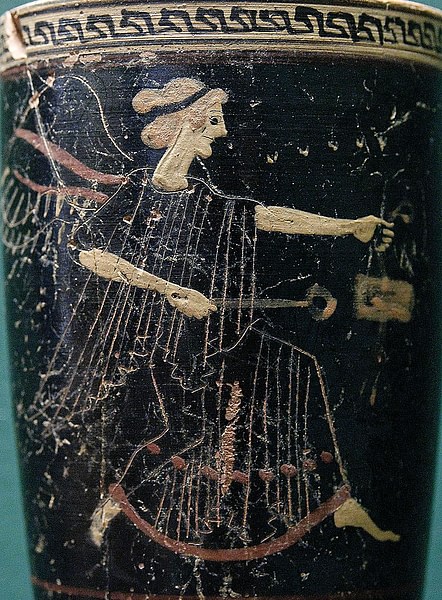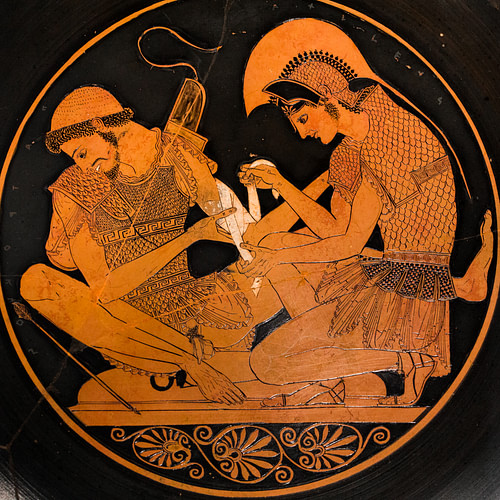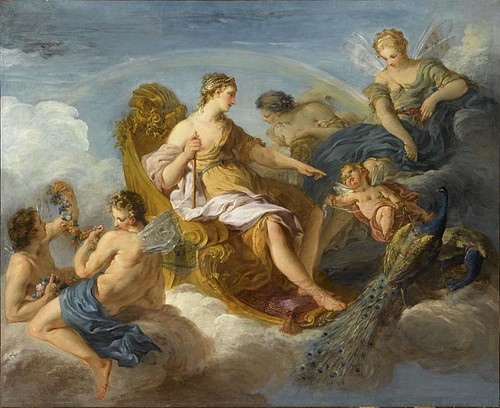
Iris is the goddess of rainbows and an important messenger between the gods and humans in Greek mythology. She was most commonly portrayed as the personal messenger of Hera. Iris was the daughter of the Titans Thaumas and Electra and the sister of the fearsome Harpies. Common epithets include "golden-winged Iris", "swift Iris", or "swift-footed Iris."
Birth & Family
As mentioned in the Theogony by Hesiod (c. 700 BCE), Iris was the daughter of the Titans Thaumas and Electra and the sister of the Harpies (half-woman, half-bird creatures). Although not mentioned in Hesiod's Theogony, other writers like Nonnus (c. 5th century CE) and Alcaeus (c. 625/620-580 BCE) state that Iris was married to Zephyrus, the West Wind and that they had Pothos (the god of yearning and desire) together. Some sources also list Eros as being their son.
Goddess of Rainbows
As the goddess of rainbows, Iris is often described as being brilliantly hued and leaving a rainbow in her wake wherever she flew. She lit up the space around her with a radiant light and used her rainbow to glide down to earth. In Ovid's (43 BCE to 17 CE) Metamorphoses, Iris refilled the clouds with water after it had rained.
Then Iris dressed herself in her cloak of a thousand colours,
she painted the sky with the arch of the rainbow.
(Ovid, Metamorphoses, 11.588-590).
The rainbow was viewed as a bridge that connected heaven and earth, symbolising Iris' role as a messenger between the gods and humans.

Messenger of the Gods
Like Hermes, Iris had the prominent role of being a messenger of the gods – mainly serving Hera and Zeus. In some sources, Iris is mentioned as sleeping under Hera's throne on Mount Olympus, so she was ready to send a message or carry out an errand at a moment's notice. However, Iris rarely ventured out near the sea or the River Styx except for when fighting broke out among the gods.
Seldom does swift Iris come,
Daughter of Thaumas, over the sea's broad back,
To bring a message. But sometimes when fights
And quarrelling arise among the gods
And some one of the gods who have their homes
On Mount Olympus tells a lie, then Zeus
Sends Iris with a golden jug to fetch
The sacred stuff by which gods swear an oath.(Hesiod, Theogony, 780-785)
When Demeter placed herself in self-imposed exile after the abduction of her daughter, Persephone, Zeus sent Iris to bring her back to Mount Olympus and take her rightful place among the gods. However, the goddess was unmoved by Iris' message. In the Aeneid by Virgil (70-19 BCE), Iris was sent to King Turnus, the enemy of the hero and Trojan prince, Aeneas. She informed him that Aeneas had left Rome to travel to King Evander of Pallanteum and that this was the perfect time to attack his allies and army. Turnus knew it was Iris and told her that he would follow her wise advice.
Iris & the Trojan War
After Hera planned a magnificent wedding for the Nereid Thetis and King Peleus of Phthia, she sent Iris to King Peleus to tell him to prepare for the big event. This wedding would be the catalyst for the chain of events that led to the Trojan War.
Iris is mentioned several times in Homer's Iliad, often in disguise, to deliver an important message or appear on the battlefield. In Book 2, Iris quickly travelled to the Trojan army and, imitating Prince Polites of Troy's voice, warned them that the Greeks had arrived in Troy. Prince Hector of Troy recognised that this was a message from the gods and gave the call for the Trojan army to ready themselves. In Book 3, Iris once again disguised herself, this time as Laodice, King Priam's daughter. She went to Helen and told her that Paris and Menelaus were to duel for her hand and placed a yearning for Menelaus and her family in her heart.
After Aphrodite was injured by King Diomedes of Argos in Book 5, Iris led her from the battlefield to safety and took her away to Mount Olympus in Ares' chariot. In Book 8, Hera and Athena disobeyed Zeus' orders and planned to assist the Achaeans. Zeus sent Iris to stop them and ordered her to take a message to Prince Hector.
Hector, son of Priam - a mastermind like Zeus!
The father has sped me down to tell you this:
so long as you see lord marshal Agamemnon storming
among the champions, mowing columns down in blood,
you must hold back, command the rest of your men
to fight the enemy, stand their headlong charge!
But soon as a spear or bowshot wounds the king
and Atrides mounts his chariot once again-
then Zeus will hand you the power to kill and kill
till you cut your way to the benched ships and the sun sinks
and the blessed darkness sweeps across the earth!(Homer, Iliad, 11.235-245).
Zeus commanded Hera to summon Iris and Apollo so that Iris could order Poseidon to withdraw from the battlefield and Apollo could encourage Prince Hector to fight once more. At once, they obeyed his orders, and Iris told Poseidon that he was to return to the gods or his sea; otherwise, he would have to answer directly to Zeus. Although reluctant to follow her orders, Iris reminded him that it would be wise to heed Zeus' warning.
Iris came to the aid of Achilles multiple times in the Iliad. In Book 18, Iris was sent by Hera in secret to take Achilles a message that he must put his armour back on and rescue the body of Patroclus from the Trojans. Iris further assisted Achilles when Patroclus' pyre would not burn. Hearing Achilles invoke the West Wind and North Wind, she flew off to alert them of Achilles' plight, and they rushed to help him light the pyre. Iris was tasked with fetching Thetis, Achilles' mother, so she could persuade him to return Hector's body to the Trojans. She also met with the grieving King Priam of Troy and relayed a message from Zeus, who pitied him and wanted to help him. She instructed him to take gifts to Achilles in exchange for Hector's body.
Iris & the Birth of Apollo
In the Homeric Hymn to Delian Apollo, the goddess Leto struggled for nine days and nine nights to give birth to Apollo. All the goddesses were there offering their support. Hera sent Iris off the island of Delos to fetch Eileithyia, the divine goddess of childbirth, to help. She ran to Mount Olympus and convinced Eileithyia to go to Delos and help Leto give birth. As soon as Eileithyia landed on the island, Apollo was born.
Iris & the Argonauts
In the Argonautica by Apollonius of Rhodes (c. 3rd century BCE), Iris came to the rescue of her sisters, the vicious Harpies, who were being pursued by the sons of Boreas (the North Wind). In their quest to find the Golden Fleece, the Greek hero Jason and the Argonauts had landed on the Thynian coast, where a wise old man named Phineus pleaded for their help. He told them of his plight with the Harpies, who had been fouling his food every time he came to eat, and informed them it was decreed that the sons of Boreas would chase them away for good. Moved by his story, the men promised to help him and made a huge feast to bait the Harpies. Sure enough, as soon as the feast was set out, the Harpies swooped down, and the sons of Boreas, Zetes and Kalais, ran after them, intent on killing them.
Seeing this, Iris quickly lept down to earth and reminded them that the gods did not decree the death of the Harpies, only that they were to be driven away. Then, using water from the River Styx, she swore they would never bother Phineus again, and the Argonauts spared their lives.
Iris & Hypnos
In Metamorphoses by Ovid, King Ceyx of Trachis was killed in a terrible storm while sailing to consult an oracle. His wife, Alcyon, was unaware of his fate and prayed to Hera each night for her husband's safe return. Hera could not accept prayers for someone who was already deceased and sent Iris to Hypnos, the god of sleep, with a message.
Iris informed Hypnos that he was to appear in Alcyon's dreams as King Ceyx and tell her of his death. Once she had relayed this message, Iris quickly departed on her rainbow as she could no longer endure the power of Hypnos.

Iris & the Women of Troy
In Virgil's Aeneid, Iris was sent by Hera down to a deserted beach where the women of Troy were mourning the death of Anchises, the father of the Trojan Prince Aeneas. Iris disguised herself as Beroe, an older woman held in high esteem by the other women. She reminded them that they had been travelling aimlessly for the past seven years in search of the fabled Italy and asked them why they did not establish a city where they were.
She picked up a torch and threw it towards the Trojan fleet. The women of Troy were entranced by her words until the oldest woman there informed them that this strange woman was not Beroe. Torn between their destiny to find Italy and staying where they were, the women went crazy. When they saw Iris flying with a rainbow following in her wake, they were stirred to action and set the ships on fire.
Legacy
From Iris, we get the name of the coloured part of the pupil in our eyes. The colour of the iris differs from person to person, depending on the amount of melanin pigment found in each iris. The words 'iridescent' and 'iridescence' are also derived from the Latin Iris and refer to the rainbow-like refraction of light.

Iris is also the genus name given to a colourful flowering plant species, which is a popular plant of choice in many gardens and has a long history dating back to ancient Egypt.










